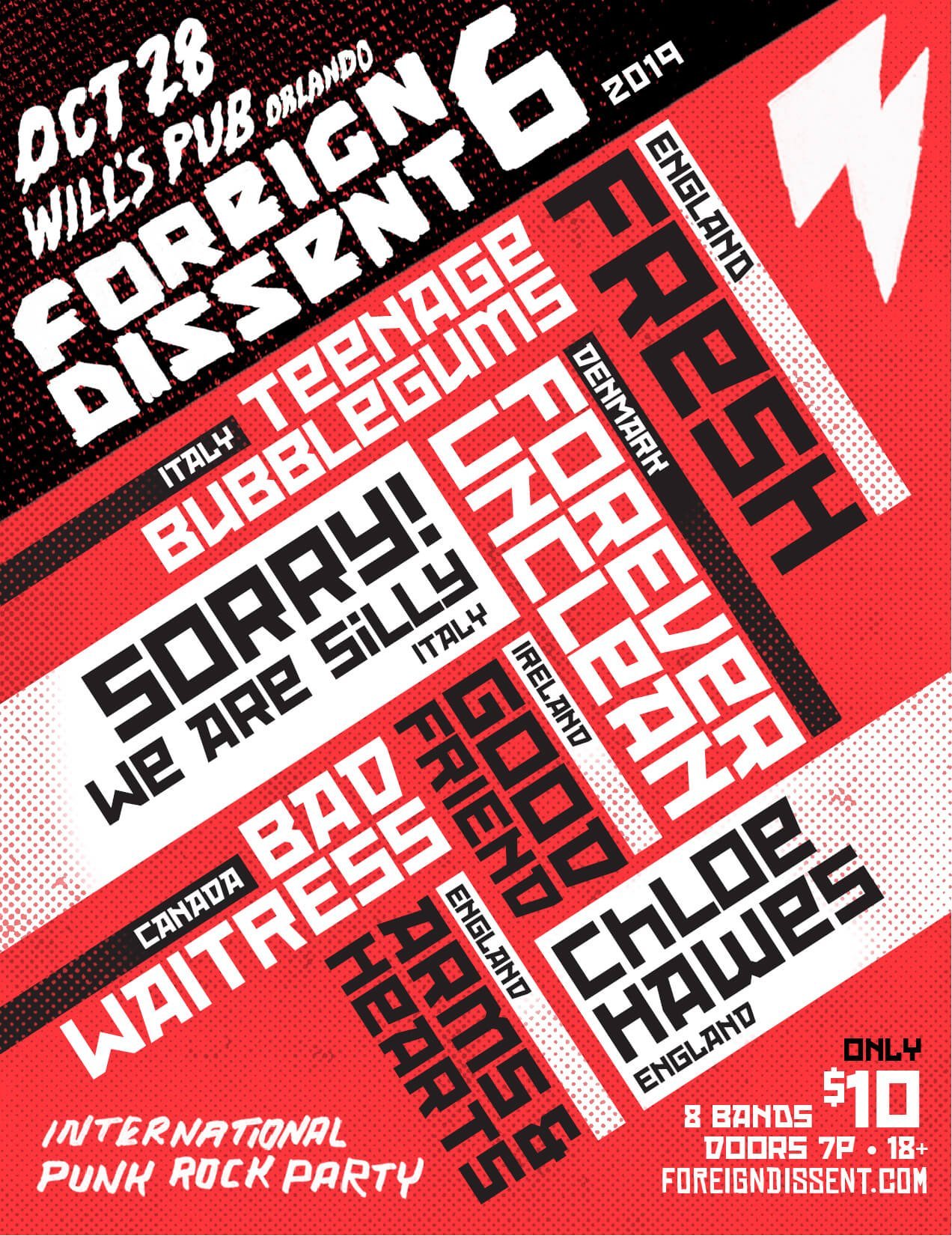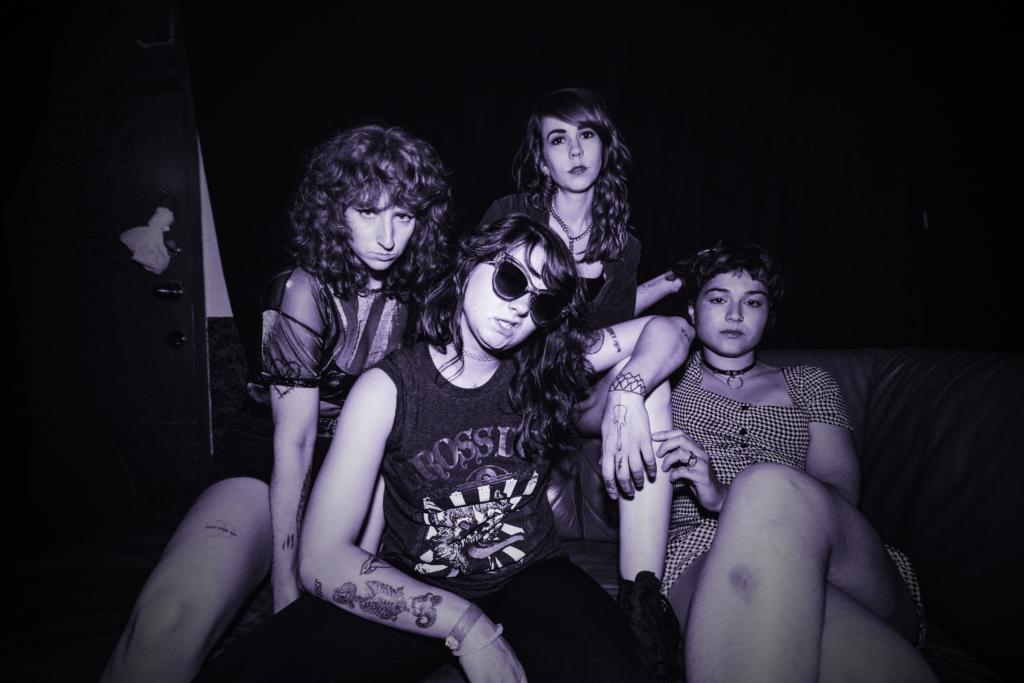Craig Mazer frequented Bad Mood Records, the rag-tag record store I owned 25-ish years ago. He was active and instrumental in Florida’s punk rock scene and published a slick-but-not-too-slick newsprint fanzine called IMPACT. Decades later, and here I am doing my thing in music-land, and Craig’s still championing the local punk rock scene. Give some credit to the lifers.
For six consecutive years, Craig’s promoted an Orlando event that might’ve been unimaginable without the internet. It’s called Foreign Dissent, and the idea is to showcase mostly undiscovered punk rock bands from all over the world to Orlando’s scenesters. It’s a diplomatic gesture from a group of fans that often get misconstrued as antagonistic and uncompromising. But punk rock is a welcoming tribe. It’s always fostered connections and curiosity among its global family. For example, my punk rock adolescence involved trading fanzines and cassettes across the ocean to addresses in exotic places like Croatia and Poland, usually copied from the classifieds in Maximum Rocknroll.
This year’s Foreign Dissent — held Monday, October 28 at the respected local venue Will’s Pub — features five countries across eight raucous bands. Denmark, Canada, Northern Ireland, Italy, and England are present, their representatives united by independence, rebellion, and a love for this music and lifestyle. Here’s the flyer:

We know that punk rock is the most DIY of music genres, its historic DIY-ness an unspoken influence on today’s shift to self-release and toward self-reliance. But punk rock was doing this when the internet was basically two guys at a military base sending chess moves to each other. How has the scene adapted to an age where the idea of DIY promotion only conjures social media tactics? Are ‘the old ways’ of punk rock word-of-mouth, city-to-city networking, and flyer slinging still in the mix?
I’m curious, and Craig Mazer — whose promotion of Foreign Dissent happens under the punkily named Punching Babies — obliged my question. “I don’t see too many people handing out flyers. I think it has largely moved to social media as the main avenue for promoting. I do still see posters put up, and I’m sure that word of mouth is still important, but social media, to me, is the main avenue.”
He continues: “Social media is where so many people are. Between Facebook and Instagram, you have a huge audience right there. Now, the question of how effective it is is debatable, but it’s undoubtedly effective to some extent. Personally, I still love the DIY aspect, so I still put up posters and flyers at shows.”
It’s interesting because promoting punk rock was once different than promoting rock n’ roll or bands of other music genres. Just as the internet has lowered the barriers of musical preferences, it’s somewhat homogenized how we promote music. But how does social media — run by corporations of a size that would make Jello Biafra have a seizure back in the day — fit into punk rock?
Craig: “Man, that’s a tough one. I don’t know that it fits into punk rock as much as punk rock has had to give in to it. Social media is so pervasive. And it’s free (putting aside the idea of buying ads on social media), so it would be foolish not to have some amount of promotional presence on it for an event. It also allows for the ease of sharing and spreading the promotion, which can help a lot.”
But there is an upside that enhances punk rock’s tight, idealistic community. Craig adds: “I think that elements of the punk ethos have ‘weaponized’ social media by calling out abusers in the scene, exposing shitty booking practices or venues that are discriminatory.”
I remember local fanzines serving that purpose. People would even make one-off fanzines to expose certain undesirable elements in the scene. It seems that sort of scene networking has moved onto social media spaces.
Craig: “Yeah, definitely. That said, i don’t remember at any time in the ’90s that there was a means (or even much of a chorus of voices) for exposing that kind of stuff. There has been a huge wave of empowerment around it in the last 5-10 years.”

I’m sure the internet makes one other thing a lot easier — organizing an international punk rock showcase. Says Craig, “It would have been very difficult 20 years ago. Even ten years ago, maybe. The internet is truly key, both for the organization of it upfront, but then also for the logistics and communications necessary as it gets closer to the day of show. I couldn’t imagine what it would have been like for a foreign band to organize a tour back in the ’90s, like when I booked tours for [legendary Orlando punk band] Shyster and had to use a (gasp) phone.”
But some things haven’t changed despite the internet. Getting punk rock bands into the US is still a hassle. Probably even more of a hassle.
Craig: “When I did the first Foreign Dissent six years ago, I had no idea what I was getting into. I hadn’t considered that these bands generally aren’t traveling with any gear. Getting into the US is hard enough, but if they come with all their gear, they’ll get tagged as coming here to work. And these small bands can’t afford work visas for a trip where they are probably going to lose money as it is. So I had to quickly scramble to find amps, a drum kit, and everything else. Some amazing friends in the music scene now loan their gear for the backline, or the bands borrow from other bands playing or buy something inside the US.”
But for Craig and many other promoters passionately exposing new acts, the hassle is worth it. “For many of these bands, it’s their first time in the US. And for some, Foreign Dissent is literally the first show they’ve ever played over here. That’s such a fulfilling feeling for me, to be able to give them that opportunity.”